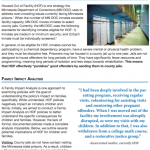 The term Housed Out of Facility, or HOF, is one strategy the Minnesota Department of Corrections (MN DOC) uses to address over-crowding issues currently facing Minnesota prisons.
The term Housed Out of Facility, or HOF, is one strategy the Minnesota Department of Corrections (MN DOC) uses to address over-crowding issues currently facing Minnesota prisons.
When we learned about the impact of HOF on one inmate, we immediately became interested in conducting a Family Impact Analysis about HOF. This mother had been involved in the parenting program at her facility and was having regular visits with her child. She had also been active mentoring pregnant offenders, was taking a college course and involved in a restorative justice group.
When she was moved, she lost access to the above, and to quality visits with her children.
A transition from contact to no contact due to HOF may be very difficult and may have negative consequences for children and families. Our Analysis reviews the unintended consequences of HOF policies and how they negatively impact an inmate’s children and family.
“The kids are well aware of the sudden change… they are constantly asking why they “can’t see mommy” and honestly, I have run out of responses that are suitable for their young minds… I believe that had the department really considered the children left behind and the impacts of their decision, there is no way that anyone could condone ripping a mother from the lives of her children even if she is in prison.”-Caregiver for two young children whose incarcerated mother is currently HOF